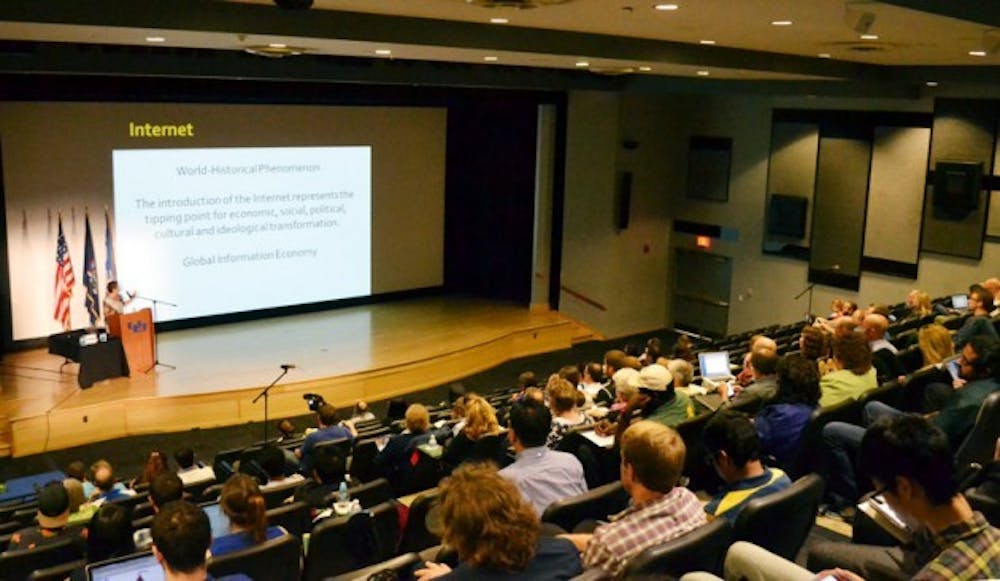On Wednesday, UB students and faculty learned how dangerous “Your Digital Footprint” could really be.
The event “Your Digital Footprint” featured five expert guest speakers in the first installment of the new Digital Challenges Series held in the Student Union Theater. UB introduced this series in a bid to raise awareness of the current trials of the Digital Age.
Brian Boetig, FBI special agent in charge of the Buffalo Office, was the first speaker to lecture about the current digital world. He focused on cyber threats that could potentially harm our country’s future if they aren’t protected against corrupt foreign governments.
He said national secrets, such as advanced technology, could get leaked because of corrupt foreign governments if our digital information isn’t secure.
“There are organizations, big businesses, corporations that are out here in this country that spend millions upon millions of dollars of research and development to bring you the next technologies,” Boetig said. “And when any foreign group, foreign nation, nation state steals this technology by breaking in, they don’t invest in anything, other than the Internet connection and their computer.”
Recent discoveries of the United States government’s data-mining program have led to rumors of law enforcement-proof phones. Boetig said the safety of families, especially children, could be compromised. He is not entirely convinced of these phones because he believes there is a need to make sure they are always capable of being detected.
Boetig professed his patriotism and combatting the constant cyber threats against America are the main reasons for his job.
“I am American and I am very proud to be here,” he said. “I want this country to be the best it can be.”
Tracy Mitrano, director of IT Policy and Institute for Computer Policy and Law at Cornell, also spoke. She discussed laws disturbed by the Internet.
Mitrano talked about the Electronic Communications Privacy Act of 1986 (ECPA), a law enacted by the United States Congress that sets provisions on what privacy rights people have when they use telephones, computers, cellphones or other means of electric transmission of communication. She gave a short history lesson on ECPA and related the content of the law to the Fourth Amendment.
She then explained the distinction between metadata and the content being collected. Mitrano used an example of calling her son to explain the concept.
Metadata would be the “telephone line” of that phone call, she said. Information like the phone numbers of the two parties and the amount of time they talked would be available as metadata. But metadata is not able to record who spoke on the devices, she said.
“It may not even be true that my son and I were talking on the phone,” she said. “But it was those two phones that were being used.”
Mitrano said agencies such as the National Security Administration (NSA) collects and uses stored metadata. Although metadata is widely used by the likes of NSA, she tried to inform the distinction between the uses of metadata and content recorded. She emphasized the need of a warrant, in order to tap a phone line for content.
Marcus Ranum, a senior strategist at Tenable Security, Inc. and another speaker in the series, said metadata is “one of those big lies.”
He believes “no one would build a system that does this, unless it actually kept the data.” Ranum said there is no value in only keeping metadata.
“If you are not doing anything wrong, you have nothing to hide” is an unfair and “rude comeback,” according to Ranum.
Ranum drew attention to a quote by Voltaire, who was a French Enlightenment writer, historian and philosopher in the 1700s, in one of the slides from the presentation: “Once government begins to engage in secret diplomacy, it cannot last long.”
Ranum said a democracy couldn’t exist if the government keeps secrets from its people.
Other speakers included Kristen Martin, assistant professor of strategic management and public policy of the George Washington University, who spoke on how companies track individuals online. Christina Peters, chief privacy officer of IBM, talked about on privacy and innovations.
email: news@ubspectrum.com





